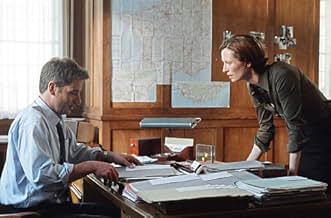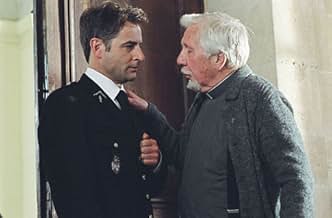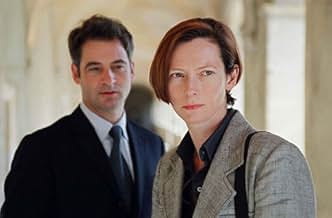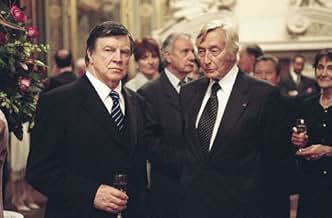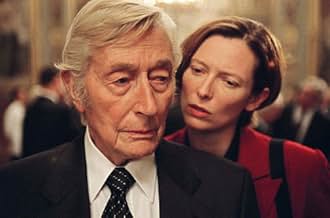AVALIAÇÃO DA IMDb
6,2/10
5,7 mil
SUA AVALIAÇÃO
Adicionar um enredo no seu idiomaTale of a former Nazi executioner who becomes a target of hitmen and police investigators.Tale of a former Nazi executioner who becomes a target of hitmen and police investigators.Tale of a former Nazi executioner who becomes a target of hitmen and police investigators.
- Direção
- Roteiristas
- Artistas
- Prêmios
- 4 vitórias no total
David de Keyser
- Dom André
- (as David De Keyser)
- Direção
- Roteiristas
- Elenco e equipe completos
- Produção, bilheteria e muito mais no IMDbPro
Avaliações em destaque
After France fell to Germany in 1940 , the Vichy regime was set up under Marshal Petain . In 1943 , the Vichy government created a military force called Milice to carry out the Nazi occupiers . When the war was over many of those involved were prosecuted for war crimes . Some get away . A few rose to power . Pierre Brossard ( Michael Caine ) committed crimes against humanity and collaborated with Nazis in WWII . Today Pierre follows hidden by priests of Catholic Church that sheltered him during fifty years and is being protected by a strange sect called The Chevaliers of St. Marie . But a judge ( Tilda Swinton ) and a colonel ( Jeremy Northam ) are investigating his past . Meanwhile , a mysterious murderous ( Matt Craven) is pursuing Pierre to kill him .
This TV movie produced by Canadian television in association with BBC packs suspense , mystery , thrills , action and is quite entertaining . Jewison cast some largely known actors as Michael Caine , his wife well played by Charlote Rampling , the starring duo as Tilda Swinton and Jeremy Northam , and a remarkable support cast as Ciaran Hinds as Inspector Pochon , Alan Bates as Bertier , Frank Finlay as the Comissaire and several others . Atmospheric musical score by Norman Corbeil and appropriate cinematography by Kevin Jewison , director's son . The motion picture is professionally produced and directed by Norman Jewison . He is a prestigious and veteran filmmaker, his greatest film is of course Jesus Christ Superstar . He considers The Hurricane (1999) the last in a trilogy of racial bigotry movies he's realized, the first two being In the Heat of the Night (1967) and A Soldier's Story (1984).
The film terminates with an epilogue based on real events , that says the following : ¨At 5:00 am , on June 29, 1944, in Rilleux -La-Pape, France, seven Jews were executed ¨. The movie is dedicated to those seven men and the 77.000 other French Jews who perished under German occupation and the Vichy regime .
This TV movie produced by Canadian television in association with BBC packs suspense , mystery , thrills , action and is quite entertaining . Jewison cast some largely known actors as Michael Caine , his wife well played by Charlote Rampling , the starring duo as Tilda Swinton and Jeremy Northam , and a remarkable support cast as Ciaran Hinds as Inspector Pochon , Alan Bates as Bertier , Frank Finlay as the Comissaire and several others . Atmospheric musical score by Norman Corbeil and appropriate cinematography by Kevin Jewison , director's son . The motion picture is professionally produced and directed by Norman Jewison . He is a prestigious and veteran filmmaker, his greatest film is of course Jesus Christ Superstar . He considers The Hurricane (1999) the last in a trilogy of racial bigotry movies he's realized, the first two being In the Heat of the Night (1967) and A Soldier's Story (1984).
The film terminates with an epilogue based on real events , that says the following : ¨At 5:00 am , on June 29, 1944, in Rilleux -La-Pape, France, seven Jews were executed ¨. The movie is dedicated to those seven men and the 77.000 other French Jews who perished under German occupation and the Vichy regime .
I rated this film a 7/10 - with some mixed feelings, because in many ways it was a downbeat film without any kind of neat "message" that would make me feel "a better person" for having seen it. But on second thought I realized that the finished film rather neatly reflects the moral complexity of Brian Moore's novel which it is based upon - and which Ronald Harwood's screenplay follows remarkably closely.
Brian Moore is one of my favorite late 20th century authors, whose work has provided the basis for several other memorable films, most notably "Black Robe." He writes in a Graham Greene-esque mode, his characters often anguished or guilty Catholics or ex-Catholics who struggle to live morally in a degraded and corrupt world. Moore himself appears to have known much about divided loyalties and twentieth century alienation. Although identified as a Canadian author, Moore was born in Ulster - and actually lived most of his later life in California and the South of France. He was clearly fascinated by questions of faith, of good and evil - and he boldly tackled these themes in "The Statement."
In France in the late 1980s and early 1990s there were several prominent cases of Vichy-era collaborators who were belatedly brought to justice by the French court system. Moore was clearly fascinated by the way in which leading members of the French governmental and bureaucratic system continued to hide unpleasant truths about their own pasts - and by the role of the Catholic Church in France in providing refuge and assistance to some individuals who had been involved in the persecution and round-up of Jews.
Michael Caine deserves a great deal of credit for taking on the role of a reprehensible character who nonetheless retains his full humanity. There's never any question in the film about his guilt - he clearly took part in the brutal murder of Jews during wartime. (He's also quite mean to dogs.) And yet he is not without a sympathetic side. It's clear that he's manipulative, but it's also easy to see why many intelligent and devout people of faith would be willing to assist him in his attempt to live "underground" hiding from justice. Caine isn't a caricatured film villain - not like Ralph Fiennes in "Schindler's List" or John Malkovich in "Ripley's Game." But in a real sense, it's all the more disturbing that he seems like "just another innocuous old man."
It was disappointing to me to see that fine performers Jeremy Northam and Tilda Swinton with so little to do in the film - other than looking bewildered as Caine's character continues to elude their grasp. On the other hand, it is quite enjoyable to watch their flirtatious glances with one another. There were many nice touches in the film showing the pleasures of French life - gourmet business lunches, for example, and the beautiful scenery of Provence. Even the supposedly seedy cafes look like they belong in a tourist brochure.
Brian Moore is one of my favorite late 20th century authors, whose work has provided the basis for several other memorable films, most notably "Black Robe." He writes in a Graham Greene-esque mode, his characters often anguished or guilty Catholics or ex-Catholics who struggle to live morally in a degraded and corrupt world. Moore himself appears to have known much about divided loyalties and twentieth century alienation. Although identified as a Canadian author, Moore was born in Ulster - and actually lived most of his later life in California and the South of France. He was clearly fascinated by questions of faith, of good and evil - and he boldly tackled these themes in "The Statement."
In France in the late 1980s and early 1990s there were several prominent cases of Vichy-era collaborators who were belatedly brought to justice by the French court system. Moore was clearly fascinated by the way in which leading members of the French governmental and bureaucratic system continued to hide unpleasant truths about their own pasts - and by the role of the Catholic Church in France in providing refuge and assistance to some individuals who had been involved in the persecution and round-up of Jews.
Michael Caine deserves a great deal of credit for taking on the role of a reprehensible character who nonetheless retains his full humanity. There's never any question in the film about his guilt - he clearly took part in the brutal murder of Jews during wartime. (He's also quite mean to dogs.) And yet he is not without a sympathetic side. It's clear that he's manipulative, but it's also easy to see why many intelligent and devout people of faith would be willing to assist him in his attempt to live "underground" hiding from justice. Caine isn't a caricatured film villain - not like Ralph Fiennes in "Schindler's List" or John Malkovich in "Ripley's Game." But in a real sense, it's all the more disturbing that he seems like "just another innocuous old man."
It was disappointing to me to see that fine performers Jeremy Northam and Tilda Swinton with so little to do in the film - other than looking bewildered as Caine's character continues to elude their grasp. On the other hand, it is quite enjoyable to watch their flirtatious glances with one another. There were many nice touches in the film showing the pleasures of French life - gourmet business lunches, for example, and the beautiful scenery of Provence. Even the supposedly seedy cafes look like they belong in a tourist brochure.
I dare say this film would have been much better received had it cast the film logically rather than have 'everybody's favourite Cockney' Michael Caine playing somebody called Pierre Boussard - I mean, Caine has never struck me as a "Pierre" somehow. And we can say for sure, that it couldn't have done any worse, a $22m financial loss is testament to that.
Of course I realise the book is in English, but there is a big difference between the two mediums and very rarely does a film pull off a stunt like this, see 'The Hunt For Red October' or Jude Law's Russian misfortune in 'Enemy At The Gates'. At least The Statement didn't slip into having Caine and co. adopt Gallic accents - that would have been too much to bare.
As for the film itself, it seemed a complete waste of police time to have half of the French PD chasing round after an OAP with a heart condition who'd been *ordered* to kill seven people 50 years earlier during German occupation. And for the film to set itself up as some sort of chase thriller, it very rarely gets past a stroll and the tension never really reaches the levels it should do.
All that said though, there are far worse films out there and this isn't an altogether bad way to spend 2 hours. 6/10
Of course I realise the book is in English, but there is a big difference between the two mediums and very rarely does a film pull off a stunt like this, see 'The Hunt For Red October' or Jude Law's Russian misfortune in 'Enemy At The Gates'. At least The Statement didn't slip into having Caine and co. adopt Gallic accents - that would have been too much to bare.
As for the film itself, it seemed a complete waste of police time to have half of the French PD chasing round after an OAP with a heart condition who'd been *ordered* to kill seven people 50 years earlier during German occupation. And for the film to set itself up as some sort of chase thriller, it very rarely gets past a stroll and the tension never really reaches the levels it should do.
All that said though, there are far worse films out there and this isn't an altogether bad way to spend 2 hours. 6/10
In Norman Jewison's tepid thriller, `The Statement,' English-accented Michael Caine plays Pierre Brossard, an aging French war criminal whose past has begun to catch up with him. In 1944, Brossard, a member of the infamous Vichy regime, not only collaborated with the Nazis, but was personally responsible for the cold-blooded execution of 14 unarmed Jewish Frenchmen as well. Immediately after the war, Brossard was tried and convicted for these offenses, but somehow managed to escape before he could face his deserved punishment. In the years since, Brossard has lived his life underground, finding protection and sanctuary from a branch of the Roman Catholic Church sympathetic to his cause. And although the French authorities have been unsuccessful in their attempts to locate him, Brossard has recently found himself the target of a mysterious group of assassins, possibly members of a secret Jewish organization seeking justice for his yet unavenged crimes against humanity.
The idea of a Nazi war criminal still living in hiding all these years after the end of World War II has the makings of an interesting movie, no doubt, but `The Statement' is not that movie. To the filmmakers' credit, they do at least attempt to present Brossard as a three-dimensional character, a man who, decades after his horrendous crimes, is still seeking redemption through his pious devotion to the Church. Caine, in a deftly balanced performance, manages to make Brossard almost sympathetic while still allowing us to see the `monster' hidden beneath the ravaged soul. Unfortunately, the actor is let down by a screenplay that seems more concerned with tired cloak-and-dagger espionage routines than with a serious study of a fascinating and conflicted character. Even more annoying is the attempt on the part of the film to paint the entire Catholic Church hierarchy as a bunch of diabolical, self-serving individuals who are busy either protecting one of their own at any or all costs or acting out of political expediency rather than true moral conviction. Fans of `The Da Vinci Code' may swallow this anti-Catholic paranoia without question, but the rest of us can merely wonder why the Church hasn't been able to cop a break from the movies since Father Damien kicked the be-Jesus out of the devil in `The Exorcist,' thirty long years ago. I'm certainly no apologist for the Catholic Church (see my review of `The Magdalene Sisters'), but even we non-believers can wonder when we will be seeing a little more evenhandedness and balance in the movies' portrayal of the Church. Certainly there must be SOME well-meaning priest, nun or bishop out there that some filmmaker might consider as worthwhile movie material.
There are other problems with the film as well. Tilda Swinton, as an impassioned judge searching for Brossard, and Jeremy Northam, as a more pragmatic policeman who reluctantly joins her in her pursuit, make an annoying, constantly bickering couple who look, for all the world, like a minor-league Mulder and Scully, minus the attraction and charm. Alan Bates and Charlotte Rampling (reunited from `Georgy Girl,' though the two actors never appear in the same scene together) are wasted in minor roles. And Jewison, who was once so fine a young director, fails to bring any of the scenes in this film to life. One also questions the propriety of taking a serious subject like Nazi atrocities and using it as little more than cheap window dressing for an undistinguished, run-of-the-mill thriller.
`The Statement,' despite another fine performance from the ever-reliable Michael Caine, is a tired, lackluster and cynical exercise, strangely devoid of meaning, conviction and purpose.
The idea of a Nazi war criminal still living in hiding all these years after the end of World War II has the makings of an interesting movie, no doubt, but `The Statement' is not that movie. To the filmmakers' credit, they do at least attempt to present Brossard as a three-dimensional character, a man who, decades after his horrendous crimes, is still seeking redemption through his pious devotion to the Church. Caine, in a deftly balanced performance, manages to make Brossard almost sympathetic while still allowing us to see the `monster' hidden beneath the ravaged soul. Unfortunately, the actor is let down by a screenplay that seems more concerned with tired cloak-and-dagger espionage routines than with a serious study of a fascinating and conflicted character. Even more annoying is the attempt on the part of the film to paint the entire Catholic Church hierarchy as a bunch of diabolical, self-serving individuals who are busy either protecting one of their own at any or all costs or acting out of political expediency rather than true moral conviction. Fans of `The Da Vinci Code' may swallow this anti-Catholic paranoia without question, but the rest of us can merely wonder why the Church hasn't been able to cop a break from the movies since Father Damien kicked the be-Jesus out of the devil in `The Exorcist,' thirty long years ago. I'm certainly no apologist for the Catholic Church (see my review of `The Magdalene Sisters'), but even we non-believers can wonder when we will be seeing a little more evenhandedness and balance in the movies' portrayal of the Church. Certainly there must be SOME well-meaning priest, nun or bishop out there that some filmmaker might consider as worthwhile movie material.
There are other problems with the film as well. Tilda Swinton, as an impassioned judge searching for Brossard, and Jeremy Northam, as a more pragmatic policeman who reluctantly joins her in her pursuit, make an annoying, constantly bickering couple who look, for all the world, like a minor-league Mulder and Scully, minus the attraction and charm. Alan Bates and Charlotte Rampling (reunited from `Georgy Girl,' though the two actors never appear in the same scene together) are wasted in minor roles. And Jewison, who was once so fine a young director, fails to bring any of the scenes in this film to life. One also questions the propriety of taking a serious subject like Nazi atrocities and using it as little more than cheap window dressing for an undistinguished, run-of-the-mill thriller.
`The Statement,' despite another fine performance from the ever-reliable Michael Caine, is a tired, lackluster and cynical exercise, strangely devoid of meaning, conviction and purpose.
After the Nazi's were driven out of France, those who had collaborated were mostly rounded up and punished many by death. However some escaped and were hidden, while others rose in power within the new regime. Pierre Brossard is one of the former and continues to live in fear, protected from those that would avenge his victims by his friends within the Catholic Church. However a close encounter shows that some group is closing in on him, meanwhile political pressure from Judge Livi and Colonel Roux's investigation into his whereabouts mean that he is quickly running out of friends willing to shelter him.
It is difficult to know how to approach this film because it itself doesn't seem too sure of what it is trying to do. Is it a drama looking at the idea of fleeing war criminals? Is it a chase movie? Is it a character piece looking at Brossard? It is never clear because it does do some elements of each but it doesn't really do anything that well and I, as a viewer, was a bit confused about what I was supposed to feel or think during it. The story itself is OK, reasonably engaging but not having anything of interest to it. As a chase film I was interested and the themes helped it seem more than the sum of its parts but not in reality. The motivations of the characters are never that well developed; the Livi/Roux parts are dull and quite routine although the sections with Brossard are more interesting.
It is a shame then that the film cannot decide what it wants to do with him do we feel for him, hate him or just watch him? The film doesn't let us decide this in a good way representing the complex nature of the character, but rather just doesn't push out any ideas one way or another. Caine does well despite this and gives a good character a bit of depth. He is where the film is although he probably benefits from the fact that everyone else is quite ordinary. Swinton and Northam are quite ordinary and their parts of the film just seem put of place and half-cooked. Support from Neville, Bates, Rampling and others just about do the job but add little.
Overall this is an OK film but nothing at all more than that. Despite the interesting and complex potential the film just delivers an ordinary chase movie and fails to do anything with the ideas and concepts inherent in it. Caine does well to produce quite a convincing character but he is alone in that, with the material and the rest of the cast failing to do anything that interesting. Not bad but not worth trying to find because it is nowhere near as good as one would have hoped.
It is difficult to know how to approach this film because it itself doesn't seem too sure of what it is trying to do. Is it a drama looking at the idea of fleeing war criminals? Is it a chase movie? Is it a character piece looking at Brossard? It is never clear because it does do some elements of each but it doesn't really do anything that well and I, as a viewer, was a bit confused about what I was supposed to feel or think during it. The story itself is OK, reasonably engaging but not having anything of interest to it. As a chase film I was interested and the themes helped it seem more than the sum of its parts but not in reality. The motivations of the characters are never that well developed; the Livi/Roux parts are dull and quite routine although the sections with Brossard are more interesting.
It is a shame then that the film cannot decide what it wants to do with him do we feel for him, hate him or just watch him? The film doesn't let us decide this in a good way representing the complex nature of the character, but rather just doesn't push out any ideas one way or another. Caine does well despite this and gives a good character a bit of depth. He is where the film is although he probably benefits from the fact that everyone else is quite ordinary. Swinton and Northam are quite ordinary and their parts of the film just seem put of place and half-cooked. Support from Neville, Bates, Rampling and others just about do the job but add little.
Overall this is an OK film but nothing at all more than that. Despite the interesting and complex potential the film just delivers an ordinary chase movie and fails to do anything with the ideas and concepts inherent in it. Caine does well to produce quite a convincing character but he is alone in that, with the material and the rest of the cast failing to do anything that interesting. Not bad but not worth trying to find because it is nowhere near as good as one would have hoped.
Você sabia?
- CuriosidadesAs of April 2019, this is producer and director Norman Jewison's last movie.
- Erros de gravaçãoWhen Brossard searches the killer's wallet, we can see 500 francs banknotes with the head of Pierre and Marie Curie. This kind of banknote was released in 1994 and the action takes place in April 1992.
- Citações
Pierre Brossard: Pray that we meet again... in this world.
- Trilhas sonorasLe Chemin des Forains
Music by Henri Sauguet
Lyrics by Jean Dréjac
Performed by Baguette Quartette
Published by G. Schirmer Inc., administered by Music Sales Corporation
Courtesy of Baguette Quartette
Principais escolhas
Faça login para avaliar e ver a lista de recomendações personalizadas
- How long is The Statement?Fornecido pela Alexa
Detalhes
- Data de lançamento
- Países de origem
- Central de atendimento oficial
- Idiomas
- Também conhecido como
- The Statement
- Locações de filme
- Empresas de produção
- Consulte mais créditos da empresa na IMDbPro
Bilheteria
- Orçamento
- US$ 27.000.000 (estimativa)
- Faturamento bruto nos EUA e Canadá
- US$ 765.637
- Fim de semana de estreia nos EUA e Canadá
- US$ 37.220
- 14 de dez. de 2003
- Faturamento bruto mundial
- US$ 1.079.822
- Tempo de duração
- 1 h 54 min(114 min)
- Cor
- Mixagem de som
- Proporção
- 1.85 : 1
Contribua para esta página
Sugerir uma alteração ou adicionar conteúdo ausente



